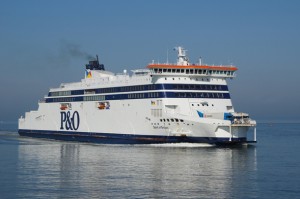Business, Freight News, Logistics, Road, Sea
P&O chief slams sulphur rules
[ October 27, 2011 // Chris ] P&O fleet director, John Garner, told the House of Commons Transport Select Committee that planned new European Commission sulphur emission limits could threaten the future of the UK ferry industry and cost up to £13.6bn. Speaking on behalf of the industry body Maritime UK, Mr Garner, who also sits on the board of the Shipping Emissions Abatement and Trading (SEAaT) group, raised concerns about the impact of proposed ultra low sulphur fuel rules for shipping in Emission Control Areas (ECAs). The proposals would mean that from 2015 ships will only be able to burn fuel with a sulphur content of 0.1 per cent or lower in ECA areas, including the North Sea and English Channel. He said: “We are supportive of efforts to reduce the impact of shipping on the environment, but these proposals just haven’t been thought through. Increasing the cost burden on shipping companies threatens jobs and risks a modal shift that would see more trade moving by road as the cost of sea transport rises. This could have a significant effect on the environment, making a mockery of attempts to cut emissions.”
P&O fleet director, John Garner, told the House of Commons Transport Select Committee that planned new European Commission sulphur emission limits could threaten the future of the UK ferry industry and cost up to £13.6bn. Speaking on behalf of the industry body Maritime UK, Mr Garner, who also sits on the board of the Shipping Emissions Abatement and Trading (SEAaT) group, raised concerns about the impact of proposed ultra low sulphur fuel rules for shipping in Emission Control Areas (ECAs). The proposals would mean that from 2015 ships will only be able to burn fuel with a sulphur content of 0.1 per cent or lower in ECA areas, including the North Sea and English Channel. He said: “We are supportive of efforts to reduce the impact of shipping on the environment, but these proposals just haven’t been thought through. Increasing the cost burden on shipping companies threatens jobs and risks a modal shift that would see more trade moving by road as the cost of sea transport rises. This could have a significant effect on the environment, making a mockery of attempts to cut emissions.”
The EC directive could also distort the market by giving cargo ship operators in non-ECA waters unfair advantages over the ferry industry by letting them continue to burn high sulphur content fuel until 2020.”
In a separate submission to the UK government on the issue P&O Ferries called for a phased approach to reducing sulphur emissions, with an accent on developing advanced technologies for new build ships rather than enforcing restrictions on the sulphur content of fuel. It also pressed for the current EC Directive proposals to be deferred until 2020 to allow for a full study of the economic, social and environmental impact to be carried out.
But there was better news for the rail freight industry on the emissions front. The Freight Transport Association said that a ‘flexibility package’ had been written into the EU’s Non-Road Mobile Machinery Directive will allow more flexibility to produce engines. This could see a maximum of 16 locomotive engines and a further ten extra engines available for the UK market alone. FTA said it had lobbied hard to significantly change the still to be signed directive which could have left rail freight operating companies in the UK unable to purchase new locomotives, with a disastrous effect on market competition and on accessibility for new market entrants.
FTA’s head of supply chain policy, Christopher Snelling said: “The NRMM had posed a serious threat to rail freight as, in its original form, it would have required new build or re-engined locomotives to be fitted with a power unit that simply wasn’t available. This would have surely stymied growth in UK rail freight.
He added that while there are still a couple of administrative steps that need to be taken before the NRMM Directive flexibility package becomes law, “it looks like our investment in putting our case the UK Government, European Commission and Parliament has paid off.”
P&O Ferries adds that even the new Spirit of Britain which recently went into service on the Dover-Calais route would not meet the proposed EU Directives for ultra low sulphur fuel. Although the ship has been designed to the most advanced requirements possible at present, the EU proposals are still too far ahead of the technology – the only way to be compliant would be to build the ship for LNG fuel and this is not an option because there are no nearby bunkering facilities.
((( credit: Andrew Cooke, marine photographer)))












